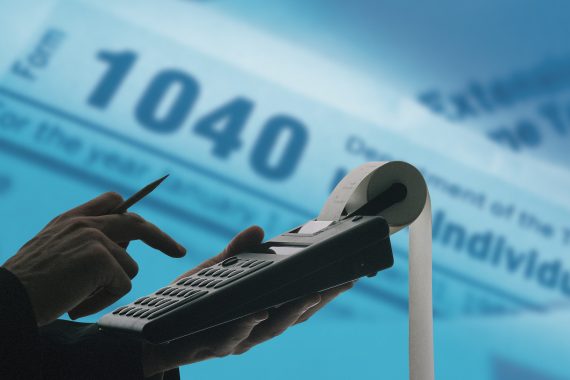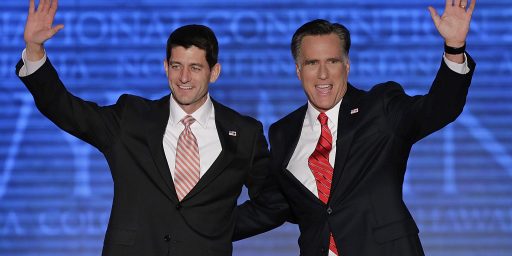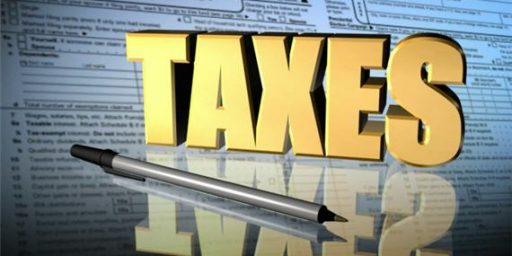No, You Still Won’t Be Able To File Your Tax Return On A Postcard
Once again, tax "reform" won't make it easier to prepare or file tax returns.
For decades now, Republicans and even many Democrats have promised voters that they would simplify the income tax for individuals to such an extent that most Americans would be able to file the tax returns on a postcard. It’s an appealing slogan, of course, because I don’t think their is a single person out there who enjoys the tedious and often mind-numbing process involved in filling out State and Federal income tax returns that typically involve filing several supporting schedules, consulting tax tables, or using software programs like TurboTax that are meant to “simplify” the tax filing process but often only serve to make it more detailed and more frustrating. Notwithstanding this promise, of course, we’ve never even gotten close to the ‘tax returns on a postcard’ promise that politicians make seemingly every election year. In the past, there have been some innovations that have allowed some individuals to avoid using the Form 1040 process, such as the 1040A and 1040EZ, but they’re generally only useful to people who don’t have a lot of deductions, don’t have kids, and don’t own a home. If you fall into any one of these categories, or all of them, you can generally forget about using the simpler forms. Additionally, electronic tax filing has made the entire tax process far easier for a large number of Americans, and made it much easier to avoid the last-minute crunch that used to lead to long lines outside Post Offices on April 15th. Even with e-iling, though, you generally either need to sit down in front of a computer for a few hours at least, or hire a professional to do the job for you.
As The New York Times notes today, that isn’t going to change with the new tax bill:
WASHINGTON — The Republican tax bill does not pass the postcard test.
It leaves nearly every large tax break in place. It creates as many new preferences for special interests as it gets rid of. It will keep corporate accountants busy for years to come. And no taxpayer will ever see the postcard-size tax return that President Trump laid a kiss on in November as Republican leaders launched their tax overhaul effort.
This was not the grand simplification of the code that Republicans promised when they set out to eliminate tax breaks and cut the number of tax brackets as they lowered rates.
As their bill tore through Congress, their ambitions fell to the powerful forces of lobbying and the status quo. Killed tax breaks returned to life. New ones sprung up beside them. A plan for three individual tax brackets became five, and finally eight.
Trade groups, such as the one for real estate agents, were able to preserve many benefits targeted for elimination. The groups whose breaks were actually killed formed an eclectic, if less powerful, bunch: bicycle commuters, gamblers, workers whose companies give them free food.
What emerged on Friday, in the final product agreed to by Republican members of a House-Senate conference committee, was a bill that layers new tax complexities upon businesses large and small, and which delivers a larger share of benefits to corporations and the rich than to the middle class.
It sets all tax relief for individuals to expire in eight years, while making deep and permanent cuts to the corporate tax rate. It limits one key benefit for taxpayers in high-tax states, such as New York, but otherwise does little to back up Mr. Trump’s promise last month that “we’re also going to eliminate tax breaks and complex loopholes taken advantage by the wealthy.”
The final legislation, which appears on track to be approved by Congress next week, offers little redress to workers who have grown to believe that the country’s tax law thicket advantages those with power, political connections and lawyers on retainer. Its evolution undermines a central selling point for a bill that is already seen by most Americans as unlikely to benefit them, according to polls.
Budget experts had hoped for a tax overhaul that stoked additional economic growth by eliminating targeted tax breaks, which would allow for lower tax rates, a trade that economists generally believe increases efficiency in the economy.
“The whole purpose of tax reform is to eliminate tax breaks to simplify the tax code and reduce rates,” said Marc Goldwein, senior vice president for the Committee for a Responsible Federal Budget in Washington. “But from what I can see, they only repeal one significant tax break, and very few if any tiny ones.”
Republican leaders spent most of the year promising something quite different. A tax plan “framework” released in September declared that Mr. Trump’s first principle for a tax bill was to “make the tax code simple, fair and easy to understand.” A collection of “policy highlights” for the House bill, when it was first released, proclaimed that the plan “eliminates special-interest deductions that increase rates and complicate Americans’ taxes.”
Those arguments echoed a message that conservative groups had found scored highly with voters — the idea that a tax bill could “un-rig” the system. In August, In Pursuit Of, a communications and marketing firm that supports the influential Koch network, conducted a focus group test of Mr. Trump delivering a short message along those lines, and it rated highly. The results were shared widely among Republicans, and echoed in party leaders’ speeches when they launched the tax push in earnest.
“With this plan, we are getting rid of loopholes for special interests, and we are leveling the playing field,” Speaker Paul D. Ryan of Wisconsin declared at a news conference unveiling the House bill on Nov. 2. “We’re making things so simple — we’re making things so simple that you can do your taxes on a form the size of a postcard.”
To some extent, the new tax bill would make filing and preparing taxes easier for some Americans. One the primary reasons for this is the fact that the standard deduction will be doubling to $12,000 for individuals and $24,000 for individuals, numbers that will mean that far fewer Americans will end up itemizing deductions, eliminating the need to document those expenses and to fill out at least one of the more common tax schedules that most Americans have been forced to use in recent decades if they want to minimize their tax liability (and who doesn’t want to do that?). There were also some provisions in the House bill that would have eliminated or sharply reduced the availability of many common deductions such as state and local taxes and large medical expenses, which are already limited to a certain percentage of taxable income. Most of those provisions were eliminated in the Senate bill, though, and did not survive the conference committee process thanks both to concerns about the impact their elimination would have on the impact on the deficit and pressures from lobbying groups and from Senators and Congressmen in states with higher state and local taxes whose citizens would be adversely impacted by the limits envisioned by the House version of the tax bill.
In reality, of course, the promise of being able to file a tax return on a postcard or some kind of simpler form is far easier said than done. Absent a significant reform of the entire tax code that eliminates most deductions, calculating tax liability is always going to be a complicated process for a large number of Americans, with the possible exception of single people with modest incomes. This is especially true for the increasingly large number of Americans who are self-employed, have investments such as mutual funds and retirement funds, or who own homes, have kids, or have medical expenses due to unforeseen circumstances. To expect otherwise is to expect the impossible.







Well, it will be easier for them now that they don’t have to handle the heavy-lifting math of multiplying one number by another number in order to determine their personal exemption. 🙄
The tax code will never be simplified for the basic reason that the tax code is advantageous for the rich and powerful. We live in a country where for the most part, “welfare” for the poor and middle class is visible and legislated, while “welfare” for the rich is opaquely hidden within the tax code.
A truly simple and “fair” (I hate that word) system would eliminate ALL (literally all) deductions and exemptions, then have congress appropriate money for causes that are deemed to be necessary or worthwhile (such as research and development) or incentives to invest in certain types of ventures, education, medical, etc..
It’s quite obvious this will never happen, but it’s interesting to consider none-the-less.
I’m a top-15% tax payer, and I live and work in a high wage high cost of living environment, and I’m not sure I want a simple postcard, as designed by our current reverse-Robin Hood Republican Congress, to be how I file my taxes.
Sometimes simplicity is not a virtue.
Maybe they could just reduce the font size…
Here is the GOP postcard.
Apparently the plan was that you need not put your name or social security number on it, apparently you need not decide if you are filing a individual or joint return, apparently you just staple your check for any taxes due to the card and give it to the cat to play with. Heck, you don’t even have to sign it.
Seriously, the effort to complete this card correctly and honestly still requires a couple of hours of software time to complete the worksheets necessary and/or consulting with a tax preparer.
The “postcard” is a joke, The GOP and the house Ways and Means committee should be ashamed.
Well, we’ll hardly need to pay taxes since the corporations that managed successfully to hide their money overseas from an IRS charging 35%, will rush en masse to subject that money to the new 21% tax rate. It’s obvious, really, imagine you have 100 tax-free dollars. Wouldn’t you rush to give 21 bucks to the IRS?
And when corporations have all that extra money they’ll spend it on paying employees more. Just as once they have more money they’ll start paying extra for commodities, utilities, rent. . . They certainly won’t spend it on enriching investors and lining their own pockets. I mean, just because that’s what the corporations say they’ll do, they’re no doubt lying and already planning all those pay raises.
As for me, I’ll take my 20% deduction on pass-through income, and my reduced top rate, and run out and hire some people to. . . to, um. . . Hmmm. Can’t think of what I’d hire someone to do, so I think I’ll just spend it on foreign travel and Michelin-starred meals.
General comment: I realize that I am biased as a CPA, but TurboTax really isn’t hard. It is written in plain English, and anyone with a bachelor’s degree should be able to sit down and get through it in an evening once they have their documents together.
If your life is simple enough that you can file on an EZ or A, there’s really nothing difficult about the current regime at all. Most people in that situation can use the free file option from H&R Block and it should take maybe an hour. Less if you are rolling forward prior year data electronically.
If your life is complicated enough that you are itemizing deductions, it is probably in your best interest to pay an expert, regardless.
@Bob@Youngstown: Rep. Kevin Brady represents the next district over from mine, and so is within my media market. Based on what I’ve seen on the evening news, everything about the man is a joke.
People actually believed Trump and the GOPs in Congress? Wa! That’s so…
quaint.
@Gromitt Gunn: I file form 1040 with the additional forms for a mortgage that I hold, and an investment portfolio and after I’ve assembled my paperwork, I can fill out the forms in an evening even without using TurboTax. And by not e-filing, I don’t have as much risk of data theft. Last that I read, filing electronically is the singlemost important factor in fraudulent income tax filings.
@Just ‘nutha ig’nint cracker: Trump has discovered the great Achilles Heel of the American populace: just lie to them; it won’t make a difference.
We’ve become so inured to the piffle we get in politicians’ comments that moving from spin/piffle to outright gas-lighting just doesn’t bother us.
There will be many tax payers who in prior years itemized but in the immediate future won’t. Unfortunately, they will need to do their taxes both using the standard deductions and itemize to determine which is most advantageous. That isn’t simple at all.
@michael reynolds: actually the repatriation rate is 15.5% in the final bill. Trump wanted 10%. Of course the majority of these repatriated funds will just go towards dividends and buybacks and do very little to nothing towards GDP growth. Basically a massive giveaway to tax avoiding corporations. But hey, that’s what the working class wants right? What a joke…so F’in sad.
@Jc:
The broader point remains. Nobody, and I do mean nobody, in this sphere is going to avail themselves of the opportunity to subject otherwise tax free profits to taxation via repatriation – at any rate Congress might enact. That these fools actually believe it has any possibility of occurring just emphasizes the lunatic fantasy nature of their planning.
What they’ll get is a polite “no, thank you”, followed by hysterical laughter as the phone is being hung up.
My taxes are very simple, have been for a few decades now. I take what documentation needed to my CPA and she calls me back in a couple weeks and I come in and sign them. Sure I could do them in a 3-6 evening, but if I apply my hourly rates to that evening, she is a bargain.
@HarvardLaw92: I thought it was a mandatory one time for all held amounts? Now that the system becomes territorial, will U.S. companies shift more to overseas?
@Jc: @HarvardLaw92:
You say you have a trillion dollars? Will you give me 35% of that? No? How about 15%? Still no? Okay, look, I’ll be really generous and only take 10%. Now will you simply hand me 100,000,000,000 dollars?
The CEO who would voluntarily give up any significant percentage of his tax-free cash hoard will be ejected from the window of the boardroom forthwith. Ditto the CEO who would spend cash on raising salaries gratuitously.
@michael reynolds:
CEO: How about I continue
tax avoidanceand invest my company’s earnings where I please?@al-Ameda:
Which will be either “fatter CEO salary/bonuses” or “stock buy-backs to boost the price and reward the stockholders who do fvck-all to actually produce our product/service.”
Or, you know, both of those.
Where it won’t go: employee salaries and benefits. Because by now everyone’s used to those being shit, so why upset the apple cart?
@OzarkHillbilly: That’s the philosophy I apply to most home repair projects. Sure, I *could* spend the entire weekend figuring out how to replace the bathroom sink, and then probably spend the next two weekends fixing the mistakes. Or I could just pay a trained bonded professional who guarantees their craftsmanship to spend 2 – 4 hours doing it right the first time.
#MAGA
FYI, medicaid/CHIP covers 900,000 people in alabama.
Too bad. Look how much postage the American taxpayers would have saved.
I remember fondly the days of 5 cent post cards. When I was a child I sent post cards to every person I could find an address for, including Santa Claus.
@Tyrell:
Which is ironic considering he’s the only one who could bring all the treats the GOP is promising from this tax plan…